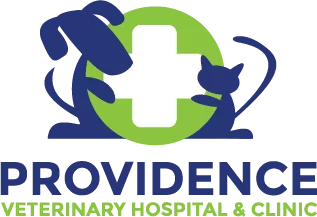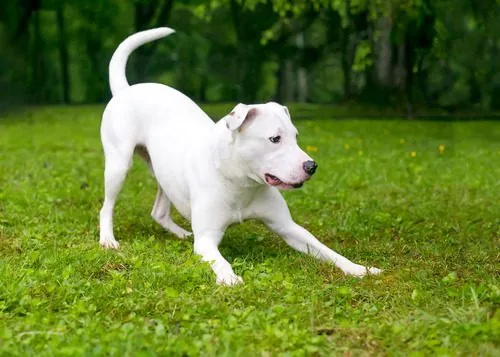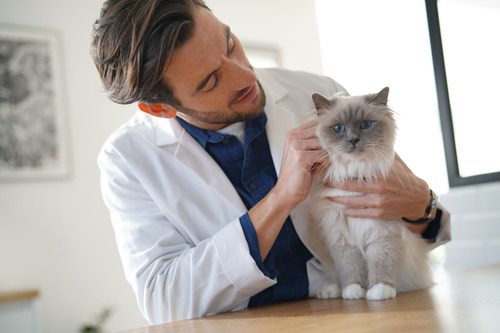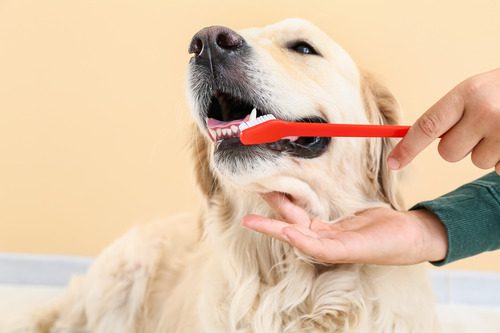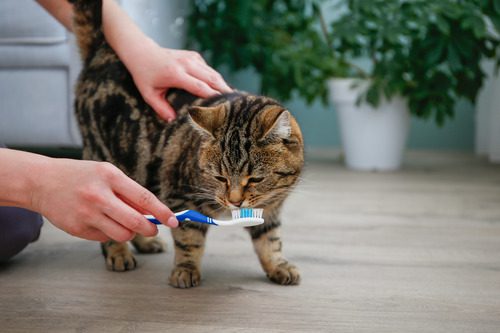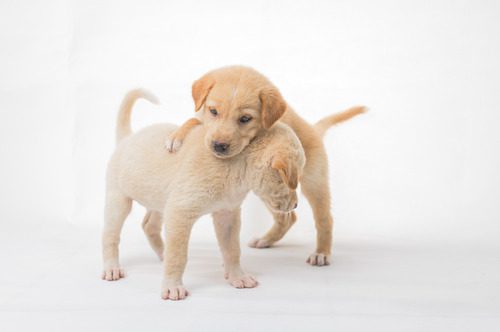Signs That Your Dog Needs a Teeth Cleaning in Alameda, CA
As a dog owner in Alameda, CA, taking care of your dog’s dental health is important, and many veterinarians recommend that a dog teeth cleaning should happen at least once a year, and sometimes more often for certain smaller breeds. But how do you know when your pet needs veterinary dental cleaning?
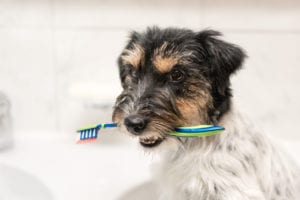
What are the Signs a Dog Teeth Cleaning is Needed?
Your pet’s teeth should be checked at least once a year by your veterinarian. That way they can detect any possible signs of possible dental issues.
Below are listed some signs that a dog teeth cleaning is needed. Call Providence Veterinary Hospital & Clinic’s East location at (510) 521-6608 or our West location at (510) 521-5775 to make an appointment today.
- Broken, loose, or wiggly teeth
- No appetite or having a hard time chewing
- Extra teeth or retained baby teeth (this is more common in small and younger dogs)
- Bad breath
- Painful mouth
- Swelling below the eye (this may indicate an abscess)
- Any swelling or inflammation around the mouth or jaw
- Bleeding from the mouth
- Excessive drooling, dropping food
- Teeth that are discolored
- Heavy tartar or cement-like deposits on teeth, especially on the back molars
- Changes in behavior, irritability
Why Does My Dog Need a Dental Cleaning?
Just as with humans, dogs need regular dental care too. One of the biggest reasons to have a dog teeth cleaning performed is to prevent periodontal disease. Also, your veterinarian in Alameda, CA can conduct a thorough oral examination, and look for other issues such as loose teeth, abscesses, and oral tumors.
What is Periodontal Disease?
Periodontal disease is caused by plaque, which is made of saliva, food, cells, and other things that form on the teeth just minutes after eating. Tooth plaque builds up and can lead to gum inflammation, which in turn can destroy gum tissue and bone. Unlike humans, periodontal disease in pets occurs five times as often as it does in people, and one statistic has shown that more than 80% of dogs over three years old have periodontal disease. If periodontal disease progresses, it sets your dog up for loose teeth, a painful mouth, bleeding gums, and systemic infections such as endocarditis, a condition where bacteria enters the chambers of the heart and causes inflammation.
What Happens When My Dog has a Dental Cleaning?
Dog teeth cleanings and procedures allow the veterinarian to closely inspect your dog’s mouth, teeth, oral cavity, and gums, and also allow the veterinarian to take radiographs to look for possible problems not visible to the naked eye. Unlike people, dogs are reluctant to sit back in a chair and sit for a dental cleaning, so veterinarians in Alameda, CA recommend general anesthesia for your dog while undergoing a dental procedure. The reasons for this are that if your veterinarian needs to do dental x-rays, scaling, or a tooth extraction, it’s safer to do this under anesthesia, and just better for your dog. For example, dogs are fully intubated while undergoing a dental, which means that there is little chance of aspiration of water and bacteria (which can cause pneumonia and endocarditis), and if extractions are needed, your veterinarian can provide adequate pain relief that can help your pet recover more comfortably.
As most dental procedures are performed under anesthesia, your veterinarian will be sure to conduct a thorough physical examination before anesthesia. Depending on several factors, and the age and health of your dog, your veterinarian may recommend blood work before the procedure to ensure that your dog’s liver and kidneys can adequately process anesthetic agents. If the blood work is good, and any other diagnostics are normal, then your dog will be ready for a dog teeth cleaning. The process usually entails the placement of an IV (intravenous) catheter, IV fluids, a pre-anesthetic dose to help your animal relax, and then the induction period when your dog is placed under anesthesia. Just as with humans undergoing general anesthesia, your veterinarian will closely monitor vital signs such as blood pressure, oxygen saturation, heart function, body temperature, and other cardio-respiratory values. Your veterinarian will conduct a thorough oral exam, just as a human dentist would, and may also take mouth radiographs. After the procedure, your veterinarian will “wake up” your dog, place him in recovery where post-procedure vitals are monitored. Most veterinarians in Alameda, CA do their dental procedures in the morning and send their patients home at the end of the day.
How Often Should I Have My Dog’s Teeth Cleaned?
The question of how often you should have your dog’s teeth cleaned depends on several factors, such as breed, size, and age of your dog. Another factor is whether or not your dog is an aggressive chewer.
Breed
Toy breeds may need dental cleanings as young a two years of age, but it’s important to keep in mind that most dogs don’t need a dental before the age of six or seven.
Size
Small dogs need a dog dental cleaning more often than larger dogs because their teeth, relative to their mouths, are big, which causes overcrowding. Another reason is that smaller breeds, such as Yorkshire Terriers, are notorious for hanging onto their baby teeth in addition to their adult teeth, which adds to overcrowding, which then leads to more places for tartar build-up.
Age
Geriatric dogs tend to need more dental care than younger dogs, and the reason is simply that time, diet, and eating habits contribute to oral decay over time. So it’s always a good idea to have annual exams with your veterinarian if your dog is over seven years of age to make sure their teeth and gums are healthy.
Short-Nosed Dogs
Dogs with short faces and noses, such as Pugs or Pekingeses, are more at risk for dental disease because they are prone to deformed permanent teeth, which gives more places for tartar to hide, and odd-shaped tooth roots that can predispose them to endodontic disease. Short-nosed dogs have very shallow tooth roots, so any kind of periodontal disease can affect them more severely than other dogs. Another breed-related dental issue in Alameda, CA is something called malocclusion, where the jaws are misaligned so that they don’t connect properly. This can lead to a predisposition to dental disease and tartar build-up.
Aggressive Chewers
Almost every dog likes to chew, and those dogs who are considered regular or avid chewers run the risk of fractured teeth and heavy tooth wear. Larger dogs don’t tend to have the dental issues that small dogs have, but they are prone to broken or fractured teeth due to strong chewing habits, and this can cause mouth pain, decreased appetite, and irritable behaviors. If you schedule regular exams with your veterinarian in Alameda, CA, they’ll be able to tell you when and how often your dog should get a dental. Heavy chewing tends to wear down the protective enamel on the occlusal (chewing) surface of the tooth, potentially exposing the underlying dentin and anatomy of the tooth, opening it up for potential infection. If you have a heavy-duty chewer, they may need more regular dental exams and dog teeth cleanings. Your veterinarian in Alameda, CA is an excellent source of advice and recommendations.
How Can I Help Keep My Dog’s Teeth Healthy?
If your dog will let you, brushing their teeth is an effective way to help keep their teeth and gums healthy. There are many products available that can help you improve your dog’s oral health, such as dental chews, water additives, enzymatic toothpaste, and specially formulated dental diets. Consult your veterinarian in Alameda, CA as to which practices would be best for you and your dog.
Contact your vet today at Providence Veterinary Hospital & Clinic at (510) 521-6608 or (510) 521-5775 with any further questions or to schedule a dog teeth cleaning!
Recent Posts
What Does Your Dog’s Tail Wag Really Mean?
What Does Your Dog’s Tail Wag Really Mean? Dogs use their tails for much more than just…
Feline Leukemia: Prevention and Detection
Feline Leukemia: Prevention and Detection Cat Feline Leukemia is a serious viral disease that affects felines worldwide….
A Team Effort: How Home Care and Professional Cleanings Keep Your Dog’s Teeth Healthy
A Team Effort: How Home Care and Professional Cleanings Keep Your Dog’s Teeth Healthy Dental health is…
The Perfect Pair: Home Care and Professional Cleanings for Your Cat’s Teeth
The Perfect Pair: Home Care and Professional Cleanings for Your Cat’s Teeth Caring for your cat’s teeth…
What is Bordetella and Why Should You Care?
What is Bordetella and Why Should You Care? Bordetella is a term many pet owners hear when…
Providence Veterinary Hospital & Clinic serve Alameda, CA as well as Oakland, San Leandro, and the surrounding areas with superb veterinary medicine and gentle, compassionate care. We’ve been a part of this community since 1947 when a veterinarian started seeing pets in his home after the end of World War II. He built an animal hospital right under his house, and that’s where we remain to this day (with modern remodeling in 2016, to outfit the hospital with the latest medical technology and equipment, of course!).
